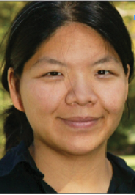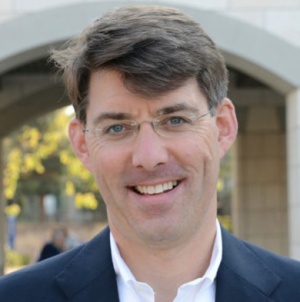Allegheny begins lecture series about environmental policy
With the annual energy challenge kicking off, “The Future of Energy Policy” has wasted no energy bringing awareness to campus with the Energy and Society public lecture series — lectures sponsored by Energy 190, a course affiliated with the energy and society minor.
The series began with Jeffrey Ball’s presentation, offering consideration of the global issues surrounding clean energy development on Sept. 25 and continued with a lecture on the challenges of water policy delivered by Robert Glennon on Tuesday, Oct. 16, in Ford Chapel. Julie Sze will conclude the series with a lecture about environmental justice at 7 p.m. on Tuesday, Nov. 27 in the Patricia Bush Tippie Alumni Center.

Assistant Professor of Environmental Science Matthew Bethurem teaches Energy 190. Working with Brian Harward, Robert G. Seddig Chair of Political Science, Bethurem developed the course; he said he and Harward wanted to focus on energy policy — Ball’s area of expertise.
The course was developed after Allegheny’s Law and Policy Program received a grant that allowed it to invite scholars to campus, and the program wanted to work to invite scholars whose work is relevant to the energy and society minor, said Matt Carter, visiting assistant professor of geology.
“They thought it would be a good partnership with the new minor being launched this fall to have the scholars be related to energy policy,” Carter said. “And so it was this kind of nice, collaboration between the two programs to do this.”

The grant gives the program flexibility to work with other programs in the future.
“This semester our focus is on energy policy, next semester our focus will be on education policy,” Harward said. “And the short course is the centerpiece of that semester’s worth of attention to energy policy.”
After deciding to bring Ball to campus, Bethurem said he and Harward wanted to expand and connect with other Allegheny professors to create a short course.
“At that point, the idea of turning it into a short course and bringing in three speakers over the course of a semester, coalesced,” Bethurem said.
The geology department had already scheduled Glennon’s visit, and Bethurem said his talk was a “natural fit” for the course.
“Considering that what Glennon does is very much focused on energy-related issues, it sort of made sense to integrate him into the mix,” Bethurem said.
Sze was chosen because her lecture would cover a unique dimension of energy policy.
“We had a conversation about the possibilities of rounding the class out, so staying focused on energy but adding an element of environmental justice, which wasn’t really going to be covered by the other two speakers, and something we felt would be crucial to this conversation,” Bethurem said.

Each speaker’s area of study built on each other, making them fit the course theme as they each offer different perspectives on energy policy.
“We wanted different types of backgrounds,” Carter said. “So Ball is a writer, Glennon is law, and Julie Sze is environmental justice. They’re sort of very different backgrounds, but they’re all sort of working on a similar problem, which is a big problem — which is what are we going to do with our energy going into the future?”
In the course, the presentations are synthesized with discussion sessions. Outside readings to explore energy policy, but the speakers’ presentations are the “backbone” of what the course is about, Bethurem said.
The course explores what it would take to convert the United States energy system into a renewable format and the justice issues that would stem from this action.
“Really broadly, the idea is the future of energy policy,” Bethurem said. “But within that, what we’re talking about and what we’re sort of interested in uncovering and having discussions about is why the energy system looks the way that it does currently, what it looks like and what it might take to switch from the system we have now to one that’s more renewably oriented in the future, so what the opportunities are there and what the obstacles are there.”
Because the Law and Policy Program dictates how the grant is used, Carter said he does not anticipate the college offering the same exact course again.
“(The program) may collaborate with a different group or might do another one in the future. We just don’t know right now,” Carter said.
Since the course is offered as a short course, students are able to learn about energy policy and its issues without the pressure of a normal course, Bethurem said.
“This is a short course, and it’s a credit–no credit course,” Bethurem said. “And because of the way it’s structured, I feel like the class gives students the opportunity to engage with this kind of material, and these kinds of speakers, in a way that lets them learn about these issues, and think deeply about these issues, without at the same time having the constraints of a whole host of homework assignments and things along those lines.”
This format, Bethurem said, would hopefully allow students to take the course even if it did not directly fit their main academic schedule.
“My hope is that it’s a unique experience for students that are interested in this kind of topic,” Bethurem said.









